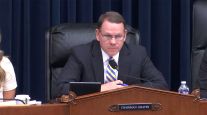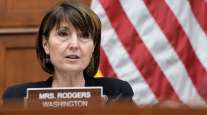Senior Reporter
Transportation Groups Keep Pressing Congress for COVID-19 Relief

[Ensure you have all the info you need in these unprecedented times. Subscribe now.]
Stakeholders representing the country’s freight and passenger transportation interests have ramped up calls for pandemic-related emergency aid as White House and congressional negotiators appear to have reached an impasse this month.
State departments of transportation, freight firms, public transit systems, the construction sector and passenger rail are among those insisting significant economic assistance is needed to help avoid disruptions to commercial and commuter connectivity.
The American Association of State Highway and Transportation Officials, for one, continues to urge Congress for an immediate infusion of $37 billion. Jim Tymon, the group’s executive director, said state DOTs have been impacted by the current economic climate and need the supplemental funding to ensure communities’ needs are met.
As Congress continues work on a #COVID19 relief bill, #stateDOTs face tough financial decisions - canceling projects, deferring maintenance, furloughing workers. https://t.co/SGRpZ0jkdp — Jim Tymon (@JimTymon_AASHTO) August 13, 2020
“Food needs to get to grocery stores,” he said. “Emergency supplies need to get to hospitals. And our transportation network is essential for all of those actions to occur.”
Separately, the American Association of Port Authorities is asking Congress to allocate $1.5 billion for seaports.
“The relief we’re seeking isn’t about replacing lost carrier, cargo and cruise passenger revenue,” said AAPA President and CEO Christopher Connor. “It’s about ensuring that ports are able to keep pace with the accelerating costs of protecting their workers while keeping their workforce employed, ensuring bond and other debt instrument payments aren’t missed, and ultimately about maintaining a state of readiness to significantly aid in the nation’s eventual economic recovery.”
Congress 0817 24 Eu Pw by Transport Topics on Scribd
The American Public Transportation Association is urging Congress to approve about $32 billion of emergency funding for public transit.
“Ignoring the essential role public transit has played during these past four months harms communities and the essential employees keeping this country moving during a pandemic,” said APTA President and CEO Paul Skoutelas. Passenger railroad service Amtrak also is seeking supplemental funding to maintain operational levels.
American Trucking Associations notes economic challenges resulting from the pandemic amplify the need to suspend a 12% excise tax on new trucks.
“Previous relief packages have worked by injecting liquidity into the markets, both for consumers and businesses, and that is a good thing,” ATA Executive Vice President of Advocacy Bill Sullivan said recently. “We also believe more targeted relief, like the suspension of the federal excise tax on truck purchases, will help stimulate the economy.”
Suspending the 12% federal excise tax will get cleaner, safer trucks on the road. Emissions from new trucks have been reduced by more than 98% over the last three decades, but more than half of the Class 8 trucks on the road today are still over 10 years old. #SuspendTheFET — American Trucking (@TRUCKINGdotORG) July 28, 2020
With most of Congress in recess, top Democrats and senior White House staff in Washington have been unable to reconcile their differences to help advance another COVID-19 aid package. It remains unclear if meaningful legislation will be adopted in the near-term.
“We have again made clear to the administration that we are willing to resume negotiations once they start to take this process seriously,” House Speaker Nancy Pelosi (D-Calif.) and Senate Minority Leader Chuck Schumer (D-N.Y.) indicated in a statement Aug. 12. “The lives and livelihoods of the American people as well as the life of our democracy are at stake.”
Treasury Secretary Steven Mnuchin responded, “The administration is willing to move forward with legislation that allows for substantial funds for schools, child care, food, vaccines, hospitals, [Paycheck Protection Program] for small businesses, rental assistance, broadband, airports, state and local government assistance, and liability protection for universities, schools, and businesses. The Democrats have no interest in negotiating.”
Senate Republican leaders unveiled a $1 trillion measure that aims to address concerns related to schools reopening, health care and employment opportunities. A House-passed package of about $3 trillion proposes aid for agencies responding to the pandemic, in addition to $15 billion for highway programs.
Ås the principal negotiators slog away, President Donald Trump moved forward with coronavirus-related executive actions. They pertain to payroll tax collection, foreclosures and evictions, student loan debt and unemployment benefits using unspent disaster funding.
“Because many of the relief programs created by the Congress have expired or will shortly expire, my administration and the Republican leadership in the United States Senate have proposed multiple options to continue to provide needed relief to Americans. But Democratic members of Congress have twice blocked temporary extensions of supplemental unemployment benefits,” according to Trump’s executive order issued Aug. 8. “Political games that harm American lives are unacceptable, especially during a global pandemic, and therefore I am taking action to provide financial security to Americans.”
Want more news? Listen to today's daily briefing:
Subscribe: Apple Podcasts | Spotify | Amazon Alexa | Google Assistant | More




